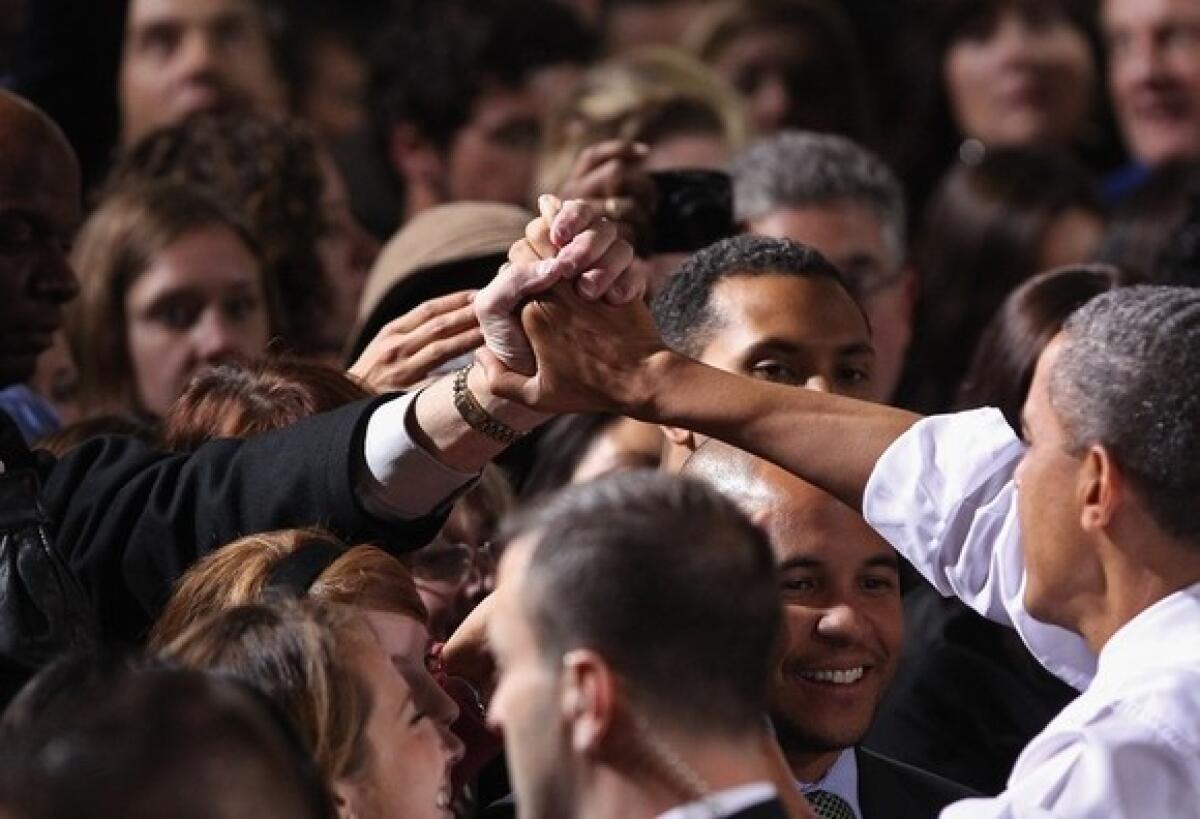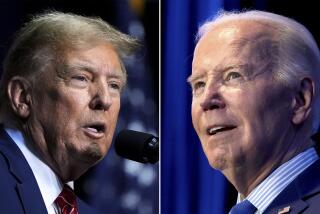Polls find a generation gap in politics that may help the GOP

The U.S. heads into the 2012 presidential contest with a large generation gap in its politics — a rarity in American elections and one that, at least for now, has boosted prospects for a Republican victory, new survey data show.
But Republicans also have a significant potential weakness, according to the data from the Pew Research Center: Older Americans, who give the GOP strong support overall, part company in a major way over Social Security. They rank that issue their second-highest concern after jobs and give Democrats the edge in handling it.
Generation gaps seldom exist in U.S. politics, stereotypes of young liberals and aging conservatives notwithstanding. Before the current gap, which made its presence felt strongly in the 2008 election, the last big generational divide appeared during the latter stage of the Vietnam War, in the 1972 race between President Nixon and Democratic Sen. George McGovern of South Dakota.
Today, two groups — one that came of age under Bill Clinton and George W. Bush, the other under Harry Truman and Dwight D. Eisenhower — look at politics with strikingly different eyes. Americans ages 18 to 29 supported President Obama in a hypothetical matchup with Mitt Romney, the Republican former Massachusetts governor, by a 26-percentage-point margin, according to the Pew data. Those ages 66 to 83, the cutoff age for the survey, backed the Republican by 10 percentage points. Voters overall were evenly split between the two.
The difference between the two groups reflects not just their experiences, but who they are. Four in 10 of the younger group are black, Latino or Asian. By contrast, the oldest group is only 21% nonwhite. Whites in the youngest group still give Obama the edge, but by a considerably smaller margin than their nonwhite peers.
Although the groups are roughly equal in size, in 2008 the generation gap gave Democrats an advantage because of the enthusiasm of their youthful supporters. This time, Republicans have an advantage because of the much higher level of engagement and interest among their voters in the older bloc.
“They’re much more angry at our political system and the government,” said Andrew Kohut, president of the Pew center.
That anger, often directed at Obama, has energized older, conservative voters about the coming election, and it exists despite their relative economic security. Among the group age 66 and older, mostly retired people, 70% said they were at least somewhat satisfied with their financial circumstances. People 65 and younger, much more exposed to the troubles of the job market, reported noticeably lower levels of economic security.
Instead of economic troubles, the anger and frustration of older Americans have “more to do with their views about the country,” Kohut said. “They look at an America that’s quite different than what they knew many years ago,” and “they don’t see change for the better.”
By contrast to the anger among older Americans, the younger group appeared disillusioned, disappointed with Obama and far less interested in the coming election.
Even though a large majority said they would vote for Obama, their approval of his presidency has plummeted, the data showed. They also reported much less interest in the election or its outcome than their elders or than did young voters in 2008. Among Americans younger than 30, 69% said they cared a good deal who wins in 2012, a number that has dropped 12 percentage points since the last election. By contrast, among those 30 and older, well over 80% said they cared a good deal, and that level has not changed significantly from 2008.
The numbers come from two Pew polls taken in September and early October, which together surveyed more than 4,400 Americans, an unusually large sample that allowed extensive analysis of different age groups. One survey has a margin of sampling error of plus or minus 2.5 percentage points; the margin on the other is plus or minus 3 percentage points.
Researchers divided the respondents into four age groups: millennials (ages 18 to 29), Generation X (30 to 46), baby boom (47 to 65) and the silent generation (66 to 83). The poll excluded responses from people older than 83, members of the dwindling World War II generation who have been strong supporters of Democrats dating back to Franklin D. Roosevelt.
The public’s views do not split along generational lines on all major issues. On abortion, for example, the data show no significant age gap: Across the board, just over half of Americans said abortions should be legal under most or all cases, and about 40% said they should be illegal. Those numbers have remained fairly stable for most of the last 15 years.
But on numerous other measures — attitudes toward race, immigration and the role of government, for example — the generations go separate ways.
Among the oldest group, for example, just over a third said they “completely” agreed that “it’s all right for blacks and whites to date each other.” Among the youngest, 75% said they completely agreed. Among the oldest, 46% said the U.S. had “gone too far pushing for equal rights” in general; 28% of the youngest agreed.
Just over half the members of the oldest group said Obama made them “uneasy” — a finding that in part appears to reflect discomfort over his race, Kohut said. That number fell to 33% among the youngest.
By 45% to 40%, the oldest group said immigrants on balance “threaten customs and values” in the U.S. rather than “strengthen society.” By an overwhelming 69%-27% ratio, the youngest said immigrants strengthened the country.
The division looked very different on Social Security, however. There, the oldest group’s view more closely hewed to the conventional liberal position. All four age groups agreed that maintaining current Social Security and Medicare benefits should take a higher priority than steps to reduce the federal budget deficit. On those two options, the split among the youngest group was 53% to 43%; among the oldest it was 64% to 27%. The oldest group opposed Social Security cuts even though they strongly supported a smaller federal government that spends less money.
The oldest group, most of whose members receive Social Security benefits, had a positive image of the program, with 57% rating it as excellent or good, compared with 40% saying fair or poor. All three of the younger groups had a net negative view of Social Security’s effectiveness. The same pattern held with Medicare, where the oldest group had a positive view by 63% to 33%.
Those under 30 expressed willingness to consider changes in the Social Security system, favoring the idea of shifting it to private accounts, for example. But political candidates hoping to gain favor among that group by trumpeting the issue face a huge hurdle: Only 13% of those under 30 ranked Social Security as one of the top two issues that would decide their presidential vote. By contrast, among the oldest group, which prefers to protect the existing system, 45% did so.
More to Read
Start your day right
Sign up for Essential California for news, features and recommendations from the L.A. Times and beyond in your inbox six days a week.
You may occasionally receive promotional content from the Los Angeles Times.







